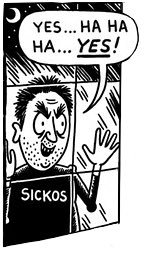It really is fundamental to understanding why people like Columbus and de Gama were the way they were from knowing the state of Europe at the time. They were violent and desparate mercenaries from a violent and desparate place, when they arrived anywhere their first thoughts were "ok, what can I immediately loot and sell here, if I don't come back with something good my debtors are gonna cut my balls off"
https://www.reddit.com/r/BlackWolfFeed/comments/oj7mzt/540_its_coming_rome_feat_patrick_wyman_71221/
That is indeed good insight. Financiers will literally be the prime mover for humans being ground into dust then act all innocent because they didn't pull the trigger themselves.
Haven't listened to this but Graeber also covers this well in Debt
listened last night and Matt actually mentions Debt in the episode. A rare current good Chapo ep.
His upcoming postuhumous book is shaping up to be very, very good so at least we'll have that
I loved the discussion about Columbus. His entire harebrained expedition being funded by a giant debt write-off scheme really shows how little we've changed since mercantilism and capitalism began to coalesce.
Graeber also explored this in Debt. The mindset enabled the conquistadors and encomienda overseers to commit unspeakable cruelties for riches like it was nothing.
I’m excited to read about this. Currently reading Open Veins and its analysis of colonial political economy is pretty good
The reading group is still up at !anarchism@hexbear.net if anyone wants to take a look.
Yeah it was a huge thing. I’m pretty sure this was the period when Genoa was really the financial engine of Europe; the feudal states were much more interested in physically holding territory
The genoese merchant class linked itself with the Spanish crown; the Genoese were intensely interested in circumventing Venice (who controlled most of trade from the more advanced Eastern civilizations). So Genoa provided the money, and Spain the muscle.
Except they of course didn’t find an alternative route to the East, but rather incredibly valuable precious metals in the Americas. The Genoese were well-positioned to integrate the literal tons of gold and silver into the European financial networks, and it was a huge “proof of concept” for the colonization and imperialism that sustains Euroamerica to this day!
That was one of the most surprising and memorable factoids I took from that book, really changes your perspective
I haven’t read much of Debt, but I’m pretty sure I was first introduced to this idea in Arrighi’s Long Twentieth Century
On another note, I thought the first Hell of Presidents was actually mostly decent and focused a lot on the actual motivations of the constitution writers.
I could listen to about 80 more episodes of Hell of Presidents. I find it much more entertaining listening to Matt go on his strange rants in a semi-controlled manner.
I think having another person on helps keep Matt in the sweetspot of rants that connect actually existing historical lines. On his vlogs he can roll off on a crazy tangent at times; this was better.
I am already feeling sad about it being over despite that being so far off. I hope they come back and jump around with some additional episodes on some of our favs
Patrick used to have a podcast called "History Matters" with his friend / former classmate / fellow historian Keith Plymers (sp?). It was really great, they got into the nuts and bolts of how historians view things. Real inside baseball type stuff but meant for a non-historian audience. It's a shame though, looks like Patrick took down most of the episodes. Would be nice if he reposted it at least just for posterity.
Curious if he found that having an inside baseball podcast up was hurting his academic career. If that's the case I don't blame him at all.
Yeah possibly. Although I remember he wasn't all that controversial in his complaints about the history profession, his big thing was there's too many historians who are happy to toil in minutae and not focus on telling narratives (using that word in a positive sense) for the broader public. And he has a point, if the real historians don't do it, the fake "historians" with zero credentials like Anne Applebaum end up filling the void.
I honestly don't know how you can even teach without a narrative. Like usually you need to come up with a broader narrative for even pure math classes, otherwise good luck keeping your students interested for several months when it seems like you're just talking about a bunch of disjointed ideas.
If my high school education is anything to go by, you build your curriculum around hitting factoids for standardized testing questions, and make the work of identifying figures, dates, and events into busywork of rote copy onto worksheets done in silence, skimming pages of a McGraw-Hill textbook for the right bolded words for an hour at a time.
He's done some cool stuff about early Human history in the past months. Stuff like early Banana cultivation in New Guinea and the Indo-European expansion. Personally I'm more interested by some of his earlier episodes about Renaissance Europe. If you've listened to and liked this new Chapo where they talk about finance and mercenary armies being pivotal to European state formation and incipient capitalism, he did an ep or two on Condottiero, the captains of renaissance mercenary companies and two episodes on Jacob Fugger, perhaps Renaissance Europe's wealthiest banker and merchant.
The book they are covering. Also I want to know more about Charles V because the Chapo's described him as a guy.
How did debt even work before like 1990?
Can't you just change your name, grow a beard, and move one town away?
I think a lot of getting loans from rich people during those times was having letters sent by common friends/acquaintances/etc. If nobody knew you and you weren't an amazing con-...-person, you weren't getting money.
I've been out on cth for a few months, I don't miss it but I do like Patrick Wyman quite a bit (even if he's not a Marxist he does seem be very much a historical materialist) so I might have to check this one out.
recommended episode: mike duncan’s interview in tides of history.
Really looking forward to that Patrick Wyman book. Probably going to get the audiobook version, history books tend to transfer really well to audiobook format for the most part, and Patrick is narrating it himself. Hopefully it keeps it big picture, because some history books will look at conflicts by like discussing munitions and logistics, which is probably the correct perspective but so fucking dry and hard to get through.
Shit tier take tbh.
Imagine living in a world with no passports, no state-issued IDs, where transatlantic travel took at least 3 weeks, where much of the world wasn't even mapped, a world where people can and did defect to indigenous territories... and then thinking "geez I'm really gonna have to face the music when I see my creditors in Europe again".
They made the choice to destroy communities rather than take refuge in them. They were utter momsters, through and through; there's no rationalizing what they did.
They did discuss how a lot of these people were massively stupid
Smart enough to make it across the ocean, smart enough to murder lots of people, not smart enough to take the better life staring them in the face.
If you want to learn more about the Italian City States and the transition from Genoa/Venice, to the Dutch Republic, then England and lastly America as the epicenter of Capitalism, check out The Long Twentieth Century







